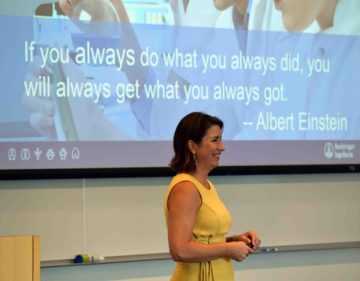Explore
Use your research skills to identify organizations, companies, and industries that align with your interests. Are you interested in making an impact in the community? Or perhaps changing policy? You can research organizations to see what employees are working on in these areas or how companies are actively seeking to make changes in the world through policy, advocacy, research, and product development.

Also use your research skills to understand the philosophy of an organization. Discover the mission statements and visions of organizations that you are interested in working for. Think about geography and the size of the organization. On the home page of an organization you can generally find an organizational chart. Identify the departments and reporting structure. This will help to understand what the missions and functions are of the company.
When searching for a career and company fit, seek evidence that their mission aligns with your values to help you make an informed decision for a good cultural fit.
How To Find Information
You can find out about industries, companies, and careers by spending time searching the internet for information about areas of interest.
- Consult the Career Exploration Roadmap for step-by-step actions to help in your decision.
- Read sample job descriptions and cover letters. What are the commonalities between the roles that interest you the most?
- Read industry reports, annual reports of non-profits, etc. to:
- Learn about the challenges that keep them up at night so you can tailor your application materials.
- Evaluate the financial health of the organization you want to join by perusing profit and loss statements.
- Use a search engine to identify recent news about the organization. Product launches, community interactions, and board memberships of leadership all help you to understand the values of an organization.
- Learn the values of the organization so you can see if you are a good fit for them and if they are a good fit for you. A good place to start is by viewing about, history, and mission pages on an organization’s website. Sometimes the job search or careers sections include that information as well.
- Gain the proper vocabulary of the career path that you are interested in. Understand what the vocabulary means when you are looking at job positions. Use the same turns of phrase in your resume and cover letter when applying to positions. There are keywords used in many different fields. When looking at a job description you see the key terminology. Become familiar with these terms and align your skills with the “lingo” of the industry.
- For industry careers in biopharma or drug development: One entry point with an explanation of the terms and process is Biotech Primer.
- For careers in government agencies: See the regulations and guides directly at the Food and Drug Administration (FDA), United States Department of Agriculture (USDA), United States Patent and Trademark Office (USPTO), for examples.
- For careers in non-profits: Leveraging funds, capacity-building, community-driven action, and stakeholders are terms and actions that employers are looking for in a recruit.
- Frequent the professional society for your target field if you know it, or search using your research keywords along with ‘association’ or ‘society’, and consult the Careers Beyond Academia LibGuide. The topical career outcome tabs in that LibGuide also link you to professionals in the sector.
What (Else) You Can Do to Explore
- Learn which careers previous Ph.D.s in your field have gone into by examining the Graduate School’s doctoral career outcomes dashboard. There you will find details on specific employers, salary ranges, and percentages of those who have gone into industry, academia, government, and non-profits.
- Talk with your network. Start with your advisor and other faculty in your field who might connect you with alumni so you can ask them questions about their careers. Include other colleges you attended and previous workplaces.
- Check out LinkedIn profiles of individuals who have the job you think you are interested in. Look at their career progression and job titles, and do some research on the employers and job postings for those titles. Consider updating your own profile to highlight your experiences and skills relevant to the role.
- Consult Cornell Career Services Career Development Toolkit for example CVs and resumes. Ask questions via CUeLINKS.
- Reach out to conduct informational interviews to learn more about the day-to-day activities, job challenges, and delights that potential jobs entail. We can walk you through this process.
Consult the sidebar menu to explore various career options by attending career panels, connecting with mentors, or creating your own activity. Consult with staff via an individual consultation to brainstorm ways to explore that will be the most meaningful to your career objectives.


